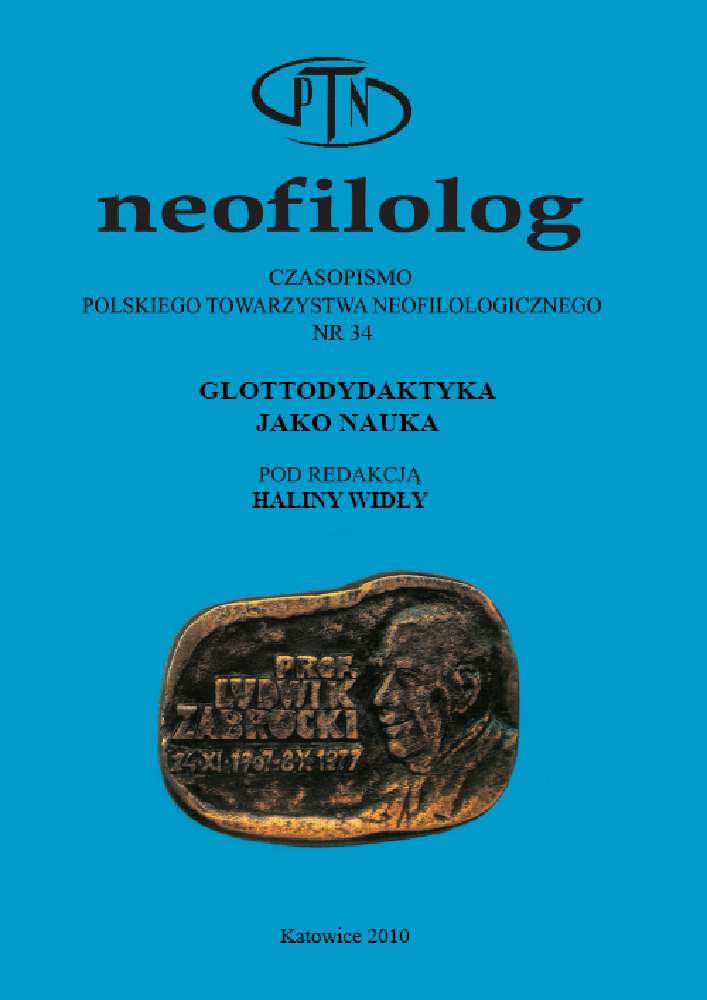Abstrakt
In this pilot study, a group of students were asked to generate metaphors on the role of the teacher and the learner and learning and teaching. Then the questionnaire data were compared with student metaphors elicited in oral interviews. The results suggest that sentence completion does not reflect informants’ true convictions, and that in contrast to theoretical assumptions, novel metaphors seem to be more consistent than conventional metaphors.
Bibliografia
Cameron, L. i G. Low. 1999. Researching and Applying Metaphor. Cambridge: Cambridge University Press.
Cieślicka, A. 2002. “Metaphors of teaching and learning: Investigating bilingual metaphorical competence” (w) PASE Papers in Language Studies (red. D. Stanulewicz). Gdańsk: Wydawnictwo Universytetu Gdańskiego, 383 – 393.
Cortazzi, M i L. Jin. 1999. “Bridges to learning: Metaphors of teaching, learning and language”. (w) Researching and applying metaphor (red. L. Cameron i G. Low). Cambridge: Cambridge University Press, 149 – 176.
Dominiek, S. i S. Rice. 1995. “Network analysis of prepositional meaning: mirroring whose mind – the linguist’s or the language user’s?” Cognitive Linguistics 6 (1), 89 – 130.
Guerrero, M. C. M. de i O. S. Villamil. 2002. “Metaphorical conceptualizations of ESL teaching and learning.” Language Teaching Research 6 (2), 95 –120.
Haser, V. 2005. Metaphor, Metonymy, and Experientialist Philosophy. Berlin, New York: Mounton de Gruyter.
Kövecses, Z. 1986. Metaphors of Anger, Pride and Love: A Lexical Approach to the Structure of Concepts. Amsterdam, Philadelphia: John Benjamins.
Kövecses, Z. 2000. Metaphor and Emotion: Language, Culture, and Body in Human Feeling. Cambridge: Cambridge University Press.
Kövecses, Z. 2002. Metaphor: A Practical Introduction. Oxford: Oxford University Press.
Kövecses, Z. 2008. “Metaphor and Emotion” (w) The Cambridge handbook of metaphor and thought (red. R. W. Gibbs). Cambridge: Cambridge University Press, 380 – 396.
Lakoff, G. i M. Johnson. 2003 [1980]. Metaphors We Live By. Chicago: University of Chicago Press.
Musiał, A. 2002. “Exploring teacher trainees’ metaphors of language teaching. “ (w) PASE Papers in Language Studies (red. D. Stanulewicz). Gdańsk: Wydawnictwo Uniwersytetu Gdańskiego. 463 – 470.
Strugielska, A. 2008. “Coherence relations and concept dynamics in learners’ personal theories”. Vigo International Journal of Applied Linguistics 5, 107 – 129.
Strugielska, A. 2008a. “Metaphorical reflections of learners’ educational experience d. M. Charzyńska-Wójcik, A. Malicka-Kleparska i J. Wójcik). Lublin: Towarzystwo Naukowe Katolickiego Uniwersytetu Lubelskiego Jana Pawła II, 53 – 62.
Werbińska, D. 2005. Skuteczny naucz yciel jęz yka obcego. Warszawa: Fraszka Edukacyjna.
Licencja
Prawa autorskie (c) 1970 Ariadna Strugielska, Krzysztof Strzemeski

Utwór dostępny jest na licencji Creative Commons Uznanie autorstwa – Bez utworów zależnych 4.0 Międzynarodowe.
Przedstawiany utwór (artykuł) upubliczniany jest na podstawie umowy z autorem i na licencji Creative Commons Attribution-NoDerivatives 4.0 International (CC BY-ND 4.0).
Użytkownicy mają obowiązek podania wraz z rozpowszechnionym utworem, informacji o autorstwie, tytule, źródle (odnośniki do oryginalnego utworu, DOI) oraz samej licencji;
- bez tworzenia utworów zależnych,
- utwór musi być zachowany w oryginalnej postaci.
Uniwersytet im. Adama Mickiewicza w Poznaniu zachowuje prawo do czasopisma jako całości (układ, forma graficzna, tytuł, projekt okładki, logo itp.).
